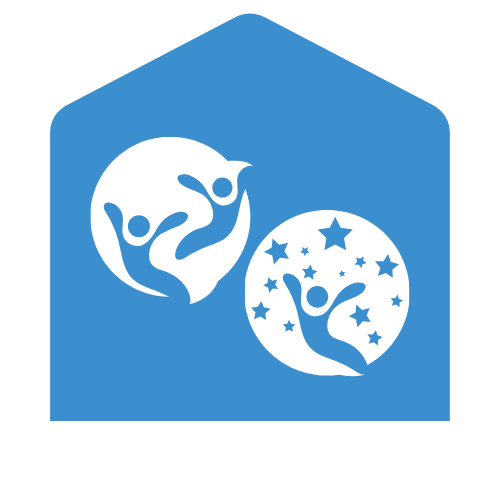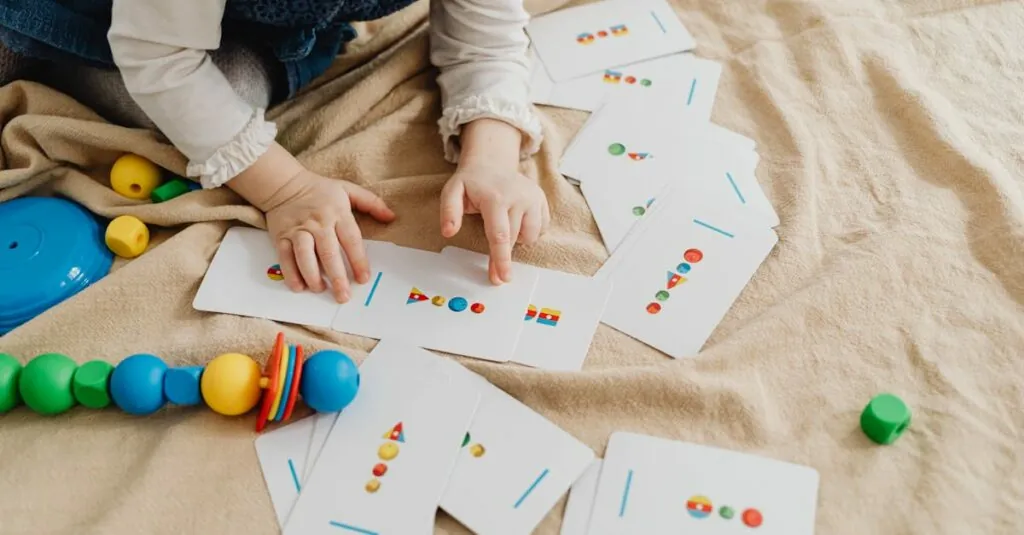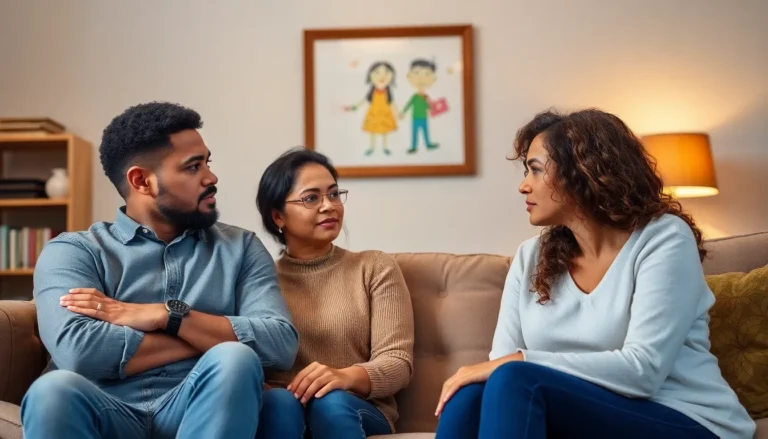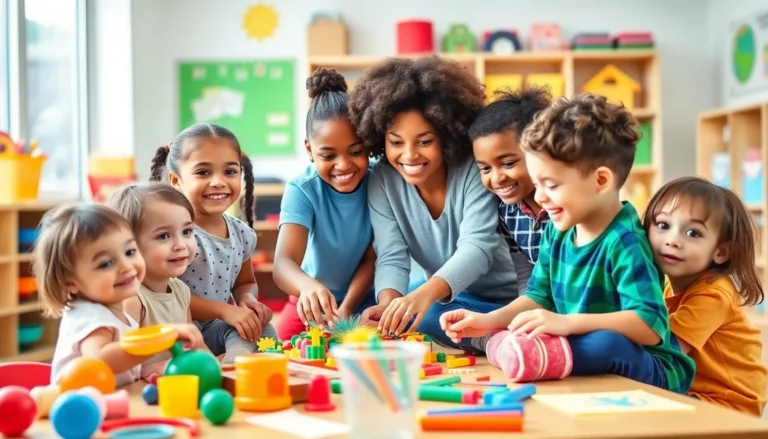Table of Contents
ToggleEarly learning isn’t just about ABCs and 123s; it’s the magical time when little minds transform into curious explorers. Imagine a world where toddlers tackle challenges like miniature superheroes, discovering the wonders of shapes and colors while mastering the art of sharing. This isn’t just playtime—it’s the foundation for lifelong learning.
In today’s fast-paced world, investing in early education is like giving your child a head start in a race they didn’t even know they were running. From developing critical thinking skills to sparking creativity, early learning experiences set the stage for future success. So buckle up and get ready to dive into the vibrant world of early education, where every moment is an opportunity for growth, laughter, and a sprinkle of chaos. After all, who wouldn’t want to witness a tiny human conquer the world, one building block at a time?
What Is Experience Early Learning?
Experience early learning refers to the hands-on, interactive opportunities that foster a child’s growth during their formative years. This specialized approach emphasizes engagement, exploration, and learning through play, enabling children to develop foundational skills in a fun, supportive environment.
Early learning experiences include activities designed to stimulate curiosity and imagination. These activities often involve arts and crafts, sensory play, and group brainstorming sessions, promoting creativity and critical thinking. They allow children to ask questions, solve problems, and think independently.
Developing social skills also forms a significant part of early learning programs. Children interact with peers, learning important lessons about cooperation, communication, and empathy. Through guided play, kids practice sharing, negotiating, and resolving conflicts, which are vital for their emotional intelligence.
Curriculum in early learning settings often integrates language and literacy efforts with mathematical concepts. Storytime, singing, and interactive games create a rich linguistic environment, helping children enhance vocabulary and comprehension. Hands-on activities using blocks or counting games introduce toddlers to basic math concepts.
Overall, experience early learning encompasses a holistic approach to a child’s education, laying a vital foundation for lifelong learning. By prioritizing early experiences, educators and parents set the stage for future academic and personal success. Investing in high-quality early learning programs helps create well-rounded individuals who are equipped to meet future challenges head-on.
Benefits Of Experience Early Learning
Experience early learning provides numerous advantages, significantly influencing a child’s growth and development. These benefits occur during formative years, where active engagement shapes future learning.
Cognitive Development
Cognitive development thrives through hands-on activities. These activities, like interactive games and storytelling sessions, allow children to explore concepts. Learning through play strengthens problem-solving skills. Children expand their vocabulary and enhance comprehension through guided language activities. Engaging in sensory play boosts their creativity and critical thinking abilities. Experiences challenge children to reason and connect ideas, laying a solid foundation for academic success.
Social Skills Enhancement
Early learning programs focus on instilling strong social skills. Children learn to communicate effectively, share, and cooperate with peers through guided activities. Group projects encourage collaboration and teamwork, building their ability to work in diverse groups. Empathy develops as they engage in role-playing scenarios. Recognizing others’ feelings and perspectives fosters emotional intelligence. Social interactions within learning environments create bonds that help children build lasting relationships. Emphasizing these skills prepares them for future social settings and enhances their overall personal growth.
Strategies For Implementing Experience Early Learning
Experience early learning thrives on engaging environments and innovative activities. Several methods foster the growth of young learners.
Home Environment
Creating an enriching home environment enhances early learning. Incorporating age-appropriate books introduces language and stimulates curiosity. Designating a space for play encourages creative exploration. Parent-child interactions through storytelling and discussions build language skills. Providing materials for hands-on activities, such as art supplies or puzzles, promotes critical thinking. Regular routines help develop a sense of security and predictability. Engaging in everyday activities, like cooking or gardening, makes learning practical and enjoyable. Such strategies empower parents to play an active role in their child’s development.
Classroom Activities
Classroom activities play a vital role in early learning. Integrating play-based approaches fosters creativity and critical thinking among peers. Structured group projects encourage teamwork and collaboration. Introducing interactive storytelling holds children’s attention and enhances their comprehension skills. Sensory tables provide hands-on experiences, allowing exploration of different textures and materials. Incorporating music and movement helps children express themselves while improving coordination. Regular outdoor activities support physical development and boost overall engagement. These strategies ensure an immersive and exciting learning environment for all children.
Challenges And Solutions
Challenges arise in implementing experience early learning programs. Limited resources often hinder access to quality materials and trained educators. Financial constraints affect both home and classroom environments, reducing opportunities for engaging activities. Additionally, varying levels of parental involvement can impact a child’s learning experience, as some parents may not prioritize educational engagement.
Solutions exist to address these challenges effectively. Investing in community resources can enhance learning experiences. Local organizations often provide funds, grants, or donations, enabling educators to acquire quality materials. Collaborating with parents can improve involvement; regular workshops and progress updates help educate families about the importance of early learning.
Strategies for overcoming challenges also include professional development for educators. Ongoing training equips them with the skills to implement play-based learning effectively. Attending workshops focuses on innovative teaching methods and activities that foster critical thinking and creativity. Integrating technology into early learning can support diverse learning styles and facilitate interactive experiences.
Creating partnerships with local businesses can further alleviate resource limitations. Businesses may sponsor events or donate supplies, enriching classroom experiences. Offering flexible schedules for parents can encourage their participation; evening or weekend events create opportunities for involvement without conflicting with work commitments.
Essentially, tackling challenges in experience early learning requires a multi-faceted approach. Strengthening community ties and enhancing educator training improves both accessibility and engagement. Fostering a collaborative environment between educators and families empowers children, ensuring they receive the support needed during their formative years.
Experience early learning is a vital investment in a child’s future. By fostering curiosity through play and hands-on activities, children develop essential skills that shape their cognitive and social abilities. This approach not only encourages creativity and critical thinking but also builds strong foundations for effective communication and collaboration.
As families and educators embrace the principles of early learning, they create enriching environments that support growth and discovery. Overcoming challenges such as resource limitations and varying parental involvement will enhance the quality of these programs. With a commitment to nurturing young minds, society can ensure that every child is equipped for success in an ever-evolving world.







